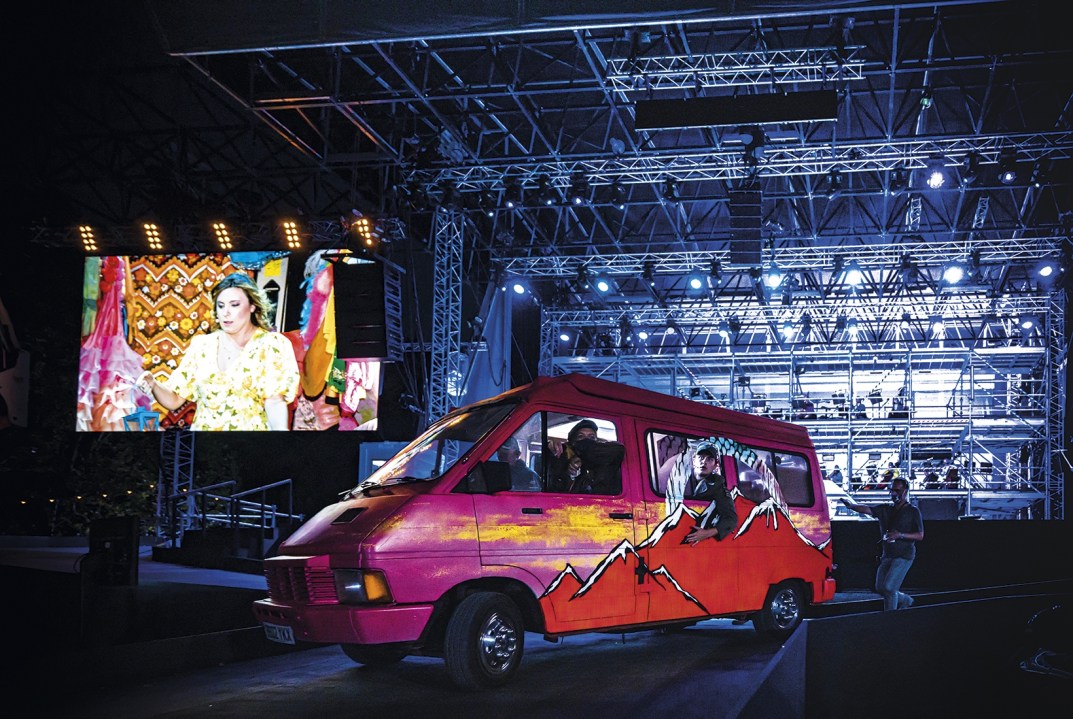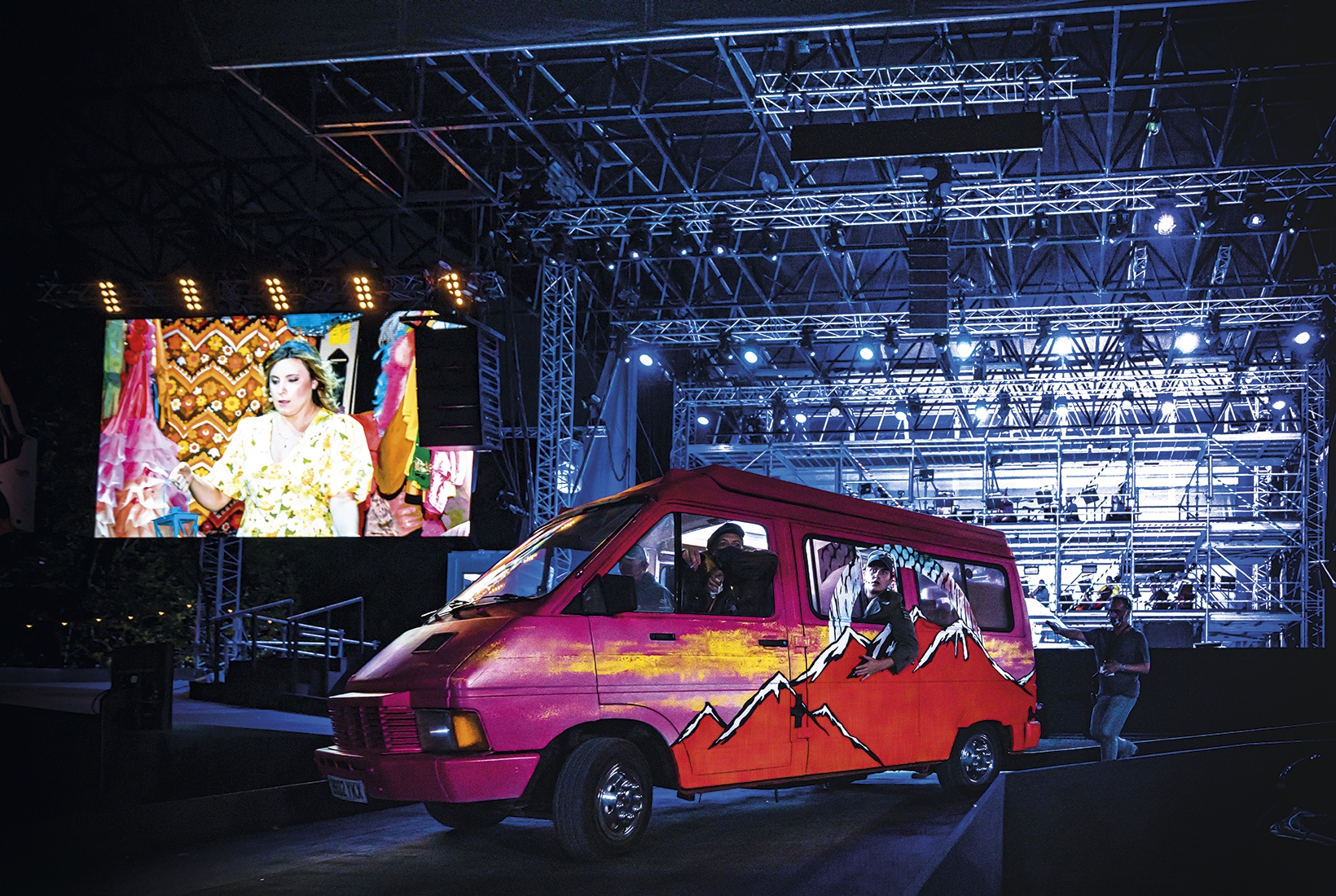The email from English National Opera was blunt: ‘Your arrival time is 18.25. If you arrive outside your allocated time slot, you may not be allowed entry.’ Perhaps, to habitual London drivers — if such people exist — negotiating the residential streets of Muswell Hill during a Saturday rush hour is all good clean urban fun. I couldn’t say. I just know that by the time I’d been marshalled into a parking space at Alexandra Palace, my no-claims bonus miraculously still intact, I was in no mood for an evening of updated and interval-free Puccini.
Three hours later I was pounding my car horn like a Neapolitan cabbie. ENO’s announcement of Britain’s first live drive-in opera provoked scepticism: this is a company with a history of announcing high-profile gimmicks that never quite happen or quietly flop. As it turned out, this newly conceived production of La bohème was not a gimmick, and it emphatically wasn’t a flop. It’s a project on an ambitious scale, managed with formidable efficiency in the service of artistic values that are as high as any at the Coliseum.
I arrived in no mood for a drive-in opera. By the end I was pounding my car horn like a Neapolitan cabbie
So you park up in front of a massive outdoor stage, flanked by two equally massive screens, and you’re free to leave your car and stroll around the Palace grounds until the performance starts. (The pedalo boats had been tied up for the night, which seemed like a missed opportunity.) The performers look tiny, though no tinier than they’d appear from an affordable seat on St Martin’s Lane. The big screens help, and with the sound broadcast to your car radio the results are at least as good as a live cinema relay. Except instead of the aroma of popcorn, you’re immersed in car fug. But hey, it’s your own car fug, which makes all the difference. One further benefit: when Act Two’s carnival performers leave the stage and start mugging and jiving their way into the audience, you have central locking. Kerchunk! The fourth wall is instantly reinstated.
PJ Harris’s production takes the whole bizarre situation and goes large with it. The location is the carpark itself, with the Bohemians as north London crusties slumming it in classic VW campervans. The Café Momus is a streetfood truck and Alcindoro (John Savournin) and Musetta (Soraya Mafi) razz up in a drop-top Mercedes (registration BIG AL). Obviously, with no chorus, there are cuts, and in keeping with the hipster setting the gaps are plugged with a grim ambient Puccini remix, complete with thudding bass: like something from a Monocle magazine weekend playlist. It was almost as jarring as the chorus of car horns that greeted each setpiece in place of applause. Let’s see how long the local residents tolerate that.
Still, you had to make some sort of noise. This was a wholly engaging cast, singing and acting without compromise. David Butt Philip, as Rodolfo, was credibly smitten with Natalya Romaniw’s fretful Mimi — one of those retro-loving cupcake-and-chintz girls, too fragile for this world. Roderick Williams was the kind of easygoing, worldly-wise Marcello you always hoped he’d be; he’s rarely sounded sexier or more natural, which is saying something. Mafi channelled Lady Gaga by way of Baby Spice, dressed like a starlet’s pet chihuahua but sending her waltz song flashing out over London in pink neon. And on the scaffolding behind the stage, Martyn Brabbins’s reduced ENO Orchestra put the calorific value through the non-existent roof. Puccini’s score swelled to fit the occasion — no small achievement when social distancing prevented any of his young lovers from embracing. I’d gladly have honked till my battery ran flat.
At Wormsley, a scaled-down Fidelio for a socially distanced audience was a more sober affair: semi-staged by Peter Mumford after the manner of Opera North’s Ring cycle, with the performers mostly confined to rectangular pools of light that mirrored the prison walls projected on to a screen behind the stage. The spoken dialogue was cut — the only practical option, but one that inevitably left the whole thing feeling a bit like a Greatest Hits compilation. I’m not complaining — this was another excellent cast, with Katherine Broderick (Leonore) soaring Valkyrie-like over Beethoven’s ever more exalted climaxes, and Toby Spence (Florestan) doing nothing to spare his voice in music that is surely as uncomfortable physically as it is emotionally.
Best of all — and this has certainly not always been the case — the 13-piece Philharmonia Orchestra played like the Berlin Phil, with meltingly tender horn and woodwind solos and conductor Douglas Boyd driving the whole thing tautly, determinedly and with deep compassion. If, once this whole episode is over, unshowy but outstanding musicians like Boyd, like Brabbins, and like Longborough’s Anthony Negus find themselves getting the prestige gigs they demonstrably deserve, there might still be hope for our operatic culture. Don’t hold your breath







Comments